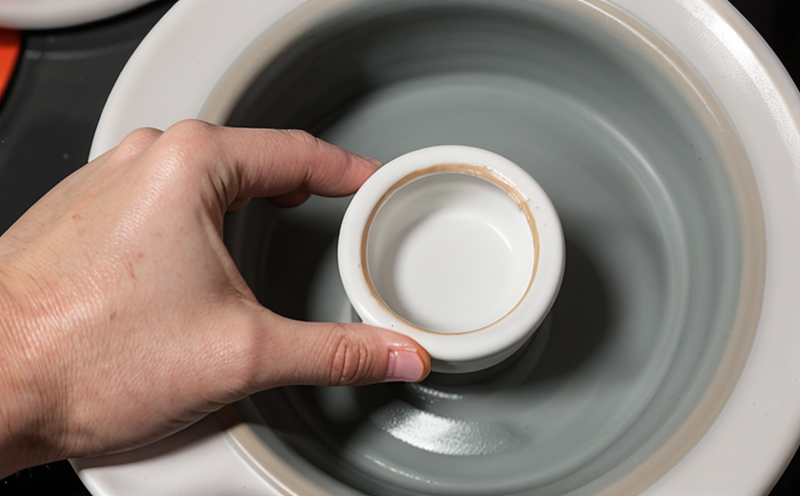ASTM C373 Water Absorption and Porosity of Nanostructured Ceramics
The ASTM C373 standard provides a standardized method for determining water absorption and porosity in nanostructured ceramics. This service is crucial for quality managers, compliance officers, R&D engineers, and procurement teams to ensure the consistency and reliability of materials used in various sectors such as aerospace, automotive, and electronics.
The testing process involves precise specimen preparation using techniques like mechanical grinding or chemical etching, followed by drying at a controlled temperature. The specimens are then weighed, submerged in water for a specified time period, and reweighed to calculate the percentage of water absorption. This method allows for accurate determination of porosity and helps in assessing material performance under various environmental conditions.
Understanding nanostructured ceramics involves recognizing their unique properties resulting from the nanoscale structure. These materials exhibit superior mechanical strength, thermal stability, and chemical resistance compared to conventional macro-scale ceramics. ASTM C373 plays a pivotal role in ensuring that these advanced materials meet stringent quality standards before they are integrated into complex systems.
The standard specifies the use of specific apparatus such as balance scales with high precision for accurate weight measurements, drying ovens for controlled temperature environments, and water tanks or baths to ensure consistent testing conditions. The acceptance criteria outlined in ASTM C373 help define tolerances within which results are considered acceptable, ensuring that only materials meeting these stringent requirements proceed further.
This service is particularly important for industries where the integrity of nanostructured ceramics directly impacts product performance and safety. By adhering to ASTM C373, manufacturers can demonstrate compliance with international standards and ensure their products meet regulatory requirements.
Scope and Methodology
| Test Parameters | Description |
|---|---|
| Water Absorption Calculation | The percentage of water absorbed by the specimen is calculated using the formula: [(W1 - W2) / W3] × 100, where W1 is the weight after drying, W2 is the weight after soaking in water for a specified time, and W3 is the initial weight of the specimen. |
| Drying Procedure | The specimens are dried in an oven at 105°C ± 2°C until constant mass is achieved. The drying period depends on the type and size of the specimen, typically ranging from 24 to 72 hours. |
| Soaking Duration | The specimens are submerged in distilled water for a minimum of 1 hour but no more than 24 hours at room temperature. |
| Weighing Precision | All weighings must be conducted with balances having an accuracy of ±0.1 mg to ensure precise calculations. |
The ASTM C373 method ensures that the testing process is consistent and reproducible, providing reliable data for quality assurance purposes. By following these detailed steps and using appropriate equipment, laboratories can accurately determine water absorption and porosity in nanostructured ceramics, thereby ensuring product reliability.
Industry Applications
- Aerospace: Ensuring the longevity of materials used in space exploration and aircraft.
- Automotive: Enhancing durability and performance of components under harsh conditions.
- Electronics: Improving reliability and lifespan of electronic devices by using more robust ceramics.
| Industry Benefits | Description |
|---|---|
| Prediction of Material Degradation | Determining water absorption helps in predicting how nanostructured ceramics will degrade under different environmental conditions, allowing for proactive measures to be taken. |
| Enhanced Product Performance | The accurate measurement of porosity ensures that materials perform optimally within their intended applications, leading to better overall product performance. |
| Compliance with Standards | By adhering to ASTM C373, manufacturers can ensure compliance with international standards, enhancing their reputation and marketability. |
The application of ASTM C373 in these industries highlights its importance not just as a testing method but also as a tool for innovation and advancement. By providing accurate data, this standard enables continuous improvement in material science, which is essential for the development of cutting-edge technologies.
Customer Impact and Satisfaction
Our commitment to excellence in ASTM C373 testing ensures that customers receive reliable and reproducible results. This service not only enhances product quality but also provides peace of mind, knowing that materials have been rigorously tested according to international standards.
By partnering with us, clients can expect:
- Precision: Our state-of-the-art equipment and skilled technicians ensure accurate measurements and calculations.
- Rigor: Every step in the ASTM C373 process is meticulously followed to maintain consistency and reliability.
- Expertise: Leveraging our extensive experience in materials testing, we offer tailored solutions that meet specific customer needs.
We pride ourselves on delivering a service that exceeds expectations, ensuring that our customers are fully satisfied with the results they achieve. Our transparent reporting processes and clear communication keep clients informed every step of the way.
Customer satisfaction is paramount to us, as it reflects directly on the quality and performance of the materials used in their products. By leveraging ASTM C373 testing, companies can ensure that they are at the forefront of innovation and compliance, setting a benchmark for excellence in their respective industries.





